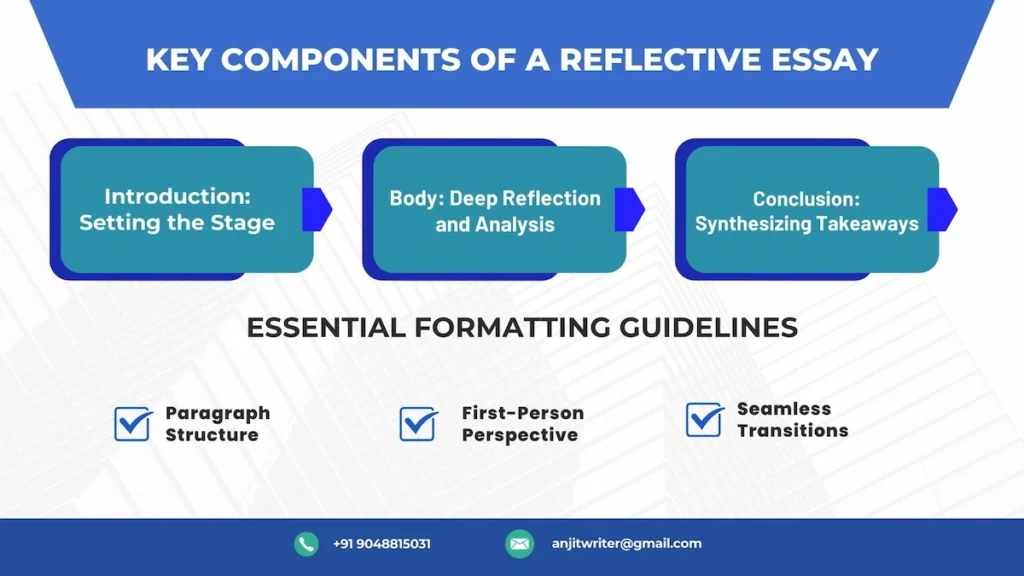As a college or university student, you come across different academic writing tasks. One that is very often needed but not everyone is familiar with is reflection paper writing. Unlike other essay writing tasks, reflection paper writing is somewhat easy due to the level of freedom it offers. However, understanding where you can be on your own and where you need to stick to the structures and guidelines is very important. This blog will get you familiar with all those and prepare you on how to write a reflection paper successfully.
What is a Reflection Paper?
A reflection paper, as you can infer from the very name it shows, is a paper where you can put your reflection or opinion. It can be about a book you read, a lecture you attended or a specific experience you have undergone. Writing a reflective essay is perhaps the easiest form of academic writing because there are no preset criteria saying what is wrong and right.
What are the Different Types of Reflective Papers?
If you examine reflection paper examples, you will know that there are essentially two different types of them: textual reflection paper and experiential reflection paper.
The former is a reflection paper writing you will take on when after reading a written work. It could be a book, an essay or an article.
An experiential reflection essay is a personal reflection essay which you write based on a personal experience you have had. In doing so, you compare your experience with a theory and try to make sense of the principles that underlie the theory.
How to Write a Reflection Paper?
Reflection paper writing is very straightforward and can be easy if you follow the right strategy. Here is a step-by-step procedure on how to write a good reflective essay for your college or university project.
1. Grasp the material thoroughly:
Getting a clear grasp of the material you are going to write the reflection paper is very important. If understanding the material in detail requires more context, look for any text available in the domain. Once you have found the text and gone through it, make a summary of it in a few paragraphs adding your personal opinion to it for later refinement.
2. Examine key insights carefully:
A detailed examination of the insights gathered about the material is essential. Whenever you find yourself disagreeing with any context, theory or opinion in the text, you can note them down as subtext or mind map with your reasons. When you sit to write the reflection, you can rely on these to make your opinion sound strong.
3. Choose a central theme wisely:
As you indulge further in how to start a reflection paper, going with a specific theme can make the writing and its tone more consistent and well-structured. To decide on a theme, the best approach could be to identify the commonalities or derived conclusions from the text.4. Link ideas with clear logic:
Before you start with the introduction for reflection paper, make sure that your thoughts and insights are flowing naturally and coherently throughout. You need to make meaningful links between different concepts you are dealing with from the material and your personal reflections. The idea is to make readers understand your thought process clearly.5. Start with a strong introduction:
The answer to how to begin a reflection paper is simple: begin it with a compelling introduction that explicitly presents the central theme or key insight you have gathered from your material. When you write the introduction, don’t forget to add a brief overview of the content you are reflecting on and establish your personal stance.6. Develop a well-structured body:
Coming to the body paragraphs, each of them must focus on a distinct point and reasonably maintain a link with your paper’s central theme. Also, it should keep the accepted reflection paper format. If the analysis requires further strengthening, support your reflections with relevant examples or quotes from the original material.7. Conclude with impactful closure:
If you wonder how to end a reflective essay, do it by synthesizing the main reflective points discussed in the paper. Don’t merely repeat the points though. Show how these insights have influenced your thinking or might be applied in practical scenarios. End with a clear, thoughtful statement that leaves the reader to learn your view.8. Review and refine your writing:
After completing your draft as per the reflective essay structure, review the content word by word for clarity, coherence, and depth. Check whether your personal viewpoints are substantiated with logical reasoning and relevant evidence from the material. Make necessary revisions to strengthen weak arguments, eliminate redundancies, and improve the overall quality of your reflection.Choosing the Right Format for Reflective Essay
As you start to learn how to write a reflective essay for university or college, you may often wonder what reflective essay outline should you use. The standard reflective paper format includes the following components:

Introduction:
The introduction introduces the subject of reflection. It will set the stage for your initial thoughts or position.Body:
The body section will cover your experiences, observations, and analysis in much more depth.Conclusion:
Conclusion:The conclusion of a reflection paper is where you will synthesise what you have learnt from the material and the takeaway reasons for your thought process.Text Format for Reflective Essays
When you go through example of reflective writing essays, you will also understand that the text formats are also important to consider in the writing. It should follow a consistent text format that provides a solid structure while letting you express yourself personally.Paragraphing:
The paper should have paragraphs with clear focus, topic sentences and supporting details.
First-Person Voice:
Convey your personal experiences using “I” statements.
Transitional ElementsTransitions:
Use smooth transitions to connect your paragraphs and ideas and to guide readers through your reflection properly.Tips On How to Write a Reflection Paper Attractive
As a student of higher education, you wouldn’t want to write and submit an average reflection essay but one that is sure to fetch you an A+. But how do you write a reflection paper attractively? Here are some secret tips from our experts.
1. Choose a topic you like:
Whether you are writing a reflection paper on a text or an experience, choose one that emotionally connects to you.2. Prepare an outline first:
As you saw under ‘how to start writing a reflection paper’, having a clear outline can save you both time and stress and bring more focus.3. Credit your sources:
If you rely on any materials for improving your understanding of a principle or a material, be ready to credit them in the reference list.4. Maintain recommended length:
As you might know from the sample of a reflective essay, conciseness is the key to this type of writing. Maintain the recommended length.5. Be genuine:
Share your thoughts and feelings genuinely. An honest reflection paper gets much more attention and thus makes a good impression.6. Reflect with Purpose:
Asking yourself questions like “What did I learn?” or “How did this change me” will allow you to indulge in deeper insights.7. Reflect with Purpose:
Asking yourself questions like “What did I learn?” or “How did this change me” will allow you to indulge in deeper insights.8. Back up your insights:
Support your thoughts by including evidence or examples. Besides strengthening your argument this will help readers connect with your thought process.9. Use sensory details:
Using plenty of sensory details in your reflection paper will allow you to describe the experience more vividly.Conclusion
Best wishes on your how to write a reflection paper journey!
The steps, format, and tips shared here will guide you in making a clear, thoughtful, and well-structured reflection paper.
Was this blog helpful in clarifying your doubts and making you confident for your next reflection assignment? Did it address your specific formatting concerns, or are there additional aspects of the reflection paper writing that you would like to explore further?
We would love to hear your thoughts on this guide.
Frequently Asked Questions (FAQ)
How to start a self-reflection essay?
Begin with a compelling introduction that presents your main theme, briefly describes the experience, and explains why it’s significant to your personal growth or understanding.
How to add references in a reflection paper?
Adding references to the material, quotes or article which you relied on to support your insights is important to prove the credibility of your work. When doing so, use any citation styles like APA or MLA that your institute recommends.
What is the recommended length for a reflection paper?
A reflection paper typically ranges between 300 to 750 words. Please make sure that you finalize the length based on your instructor’s guidelines. While adhering to the recommended word count, don’t forget to ensure that there is enough detail to convey insights without losing focus.
How does a research paper differ from a reflection paper?
While a research paper focuses on analyzing and presenting objective facts on a topic, a reflection paper deals with personal insights, emotions, and learnings from an experience or text. Going through a couple of academic reflective essay examples will let you know this distinction with much more context and clarity.
Should I write my reflection paper in the first person?
Yes, reflection papers are generally written in the first person. With first-person voice, you can easily express your thoughts, feelings, and experiences with more authenticity and straightforwardness.
How to write a reflective essay introduction?
Start with a thought-provoking statement in your reflection essay introduction. It could be a question or a brief anecdote. After that, gradually introduce your core theme with an overview of the experience you want to reflect on.
How to write the conclusion for a reflective essay?
To conclude your reflection essay, summarize your key insights with context detailing how the experience influenced your understanding. Make sure that the readers are left with a solid final thought that underscores your reflection.

